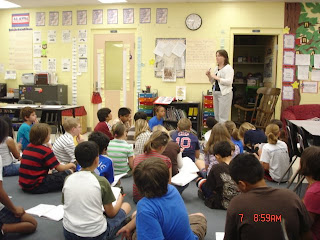1)New Team WOW Days
The new grade level team meets in the administrative conference roo
 m while their kids are rotating through their WOW resources. They gather for 1/2 a day to meet one another, share their professional and personal backgrounds, and rally around their new team mates. This is a forum for discussion, questions, and the penning of grade level non-negotiables. Conversation is based on a wide range of topics from instruction to grade level management including selecting a new team leader and committee members, sharing classroom schedules, getting an overview of grade level homework, discussing common assessments, planning for diagnostic assessment, glancing at content pacing guides, and conversing about standards, portfolios, and word walls. Teachers leave exhilarated and ready to take on this new challenge, because they have fewer questions and can begin planning for their new experience.
m while their kids are rotating through their WOW resources. They gather for 1/2 a day to meet one another, share their professional and personal backgrounds, and rally around their new team mates. This is a forum for discussion, questions, and the penning of grade level non-negotiables. Conversation is based on a wide range of topics from instruction to grade level management including selecting a new team leader and committee members, sharing classroom schedules, getting an overview of grade level homework, discussing common assessments, planning for diagnostic assessment, glancing at content pacing guides, and conversing about standards, portfolios, and word walls. Teachers leave exhilarated and ready to take on this new challenge, because they have fewer questions and can begin planning for their new experience.2)Co-Teaching Workshop

All learning leaders beginning a co-teach journey or with a new co-teach partner meet with two experienced co-teachers who lead a ½ day workshop on valuable topics. The day begins with an ice breaker to get the teachers acquainted and then transitions into a personal teaching survey, The Kind of Teacher I Am. Teachers reflect and share their survey with their partner. The survey generates
 dialogue from arrival and departure times to teaching strengths and weaknesses to favorite and least favorite parts of their day. The presenters then share five Co-Teaching Models. Some teachers, at this point, ask questions to clear up misconceptions about what co-teaching is and what co-teaching is not. Next, the presenters share the Chets Creek Co-Teach Non-Negotiables. Teachers must commit to certain criteria to enter this “school marriage” including: find effective compromises, plan together, communicate effectively and respectfully, supervise outside at recess, both teachers attend parent conferences, both teachers write notes to parents etc...To conclude, teachers are given three big topics to discuss: Planning/Communication, Behavior Management, and Classroom Systems. They are left with tools to complete and discuss to learn more about each other. This valuable workshop allows teachers to plan so the transition into co-teaching is an enjoyable one.
dialogue from arrival and departure times to teaching strengths and weaknesses to favorite and least favorite parts of their day. The presenters then share five Co-Teaching Models. Some teachers, at this point, ask questions to clear up misconceptions about what co-teaching is and what co-teaching is not. Next, the presenters share the Chets Creek Co-Teach Non-Negotiables. Teachers must commit to certain criteria to enter this “school marriage” including: find effective compromises, plan together, communicate effectively and respectfully, supervise outside at recess, both teachers attend parent conferences, both teachers write notes to parents etc...To conclude, teachers are given three big topics to discuss: Planning/Communication, Behavior Management, and Classroom Systems. They are left with tools to complete and discuss to learn more about each other. This valuable workshop allows teachers to plan so the transition into co-teaching is an enjoyable one.

















